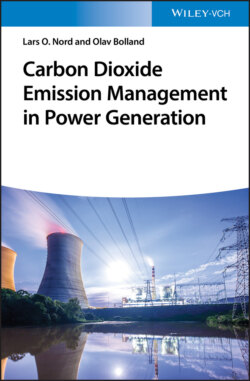Читать книгу Carbon Dioxide Emission Management in Power Generation - Prof. Lars O. Nord - Страница 19
1.5 Climate Change
ОглавлениеMost people nowadays seem to accept that the observed change in global climate, especially during the past two decades, is man-made through emissions of greenhouse gases. Scientific knowledge of the global climate has developed greatly, not to fully understand it but to support a high probability for the link between change in global climate and man-made emissions of greenhouse gases (IPCC-WG1 2007). It is remarkable how the scientific community has moved over the past 20 years from strong disputes about climate science to the consensus observed today. Industrial corporations and most governments seem to accept the findings of the scientific community.
Is climate change good or bad? For some people, a warmer climate will definitely improve their life in many respects. Changes in the occurrence of animal and plant species may impact many people's comprehension of nature but would not necessarily be bad. The extinction of species and the appearance of new species is a continuous process in nature, and throughout history, climate change has been one cause for it. However, it is likely that climate change may result in a partial meltdown of the ice caps in Greenland and in Antarctica. The meltdown of thick ice caps was previously believed to be a very slow process, but recent knowledge indicates that the meltdown process is actually rather fast. Another negative effect is increased weather variability, with more storms and occurrences of heavy precipitation. In general, one can say that global warming will probably cause many problems for a large number of humans, resulting in the need for change with respect to where people can live and how to organise their society.
As mankind has always done in the past, he will somehow adapt to climate change. The ability and possibility to adapt will vary a lot depending on the location. Rich countries or countries with a lot of space will be able to adapt more easily to climate change than poor or densely populated countries. It is a paradox and an ethical dilemma that countries with the best ability to adapt to climate change are the ones emitting the most greenhouse gases. A very important decision we have to make is how we spend our resources between adapting to and reducing global warming.
In the future, we will most likely combine measures on how to reduce global warming and how to adapt to it. It is very difficult to know what measures should be emphasised. The longer we wait to introduce measures to reduce global warming, the more likely adaptation measures will become. It is also uncertain which measure will be most cost-effective, but today, it seems most people are in favour of reducing greenhouse gas emissions as a precautionary measure. Some countries and regions may only want to implement adaptation measures as they see the need for them.
